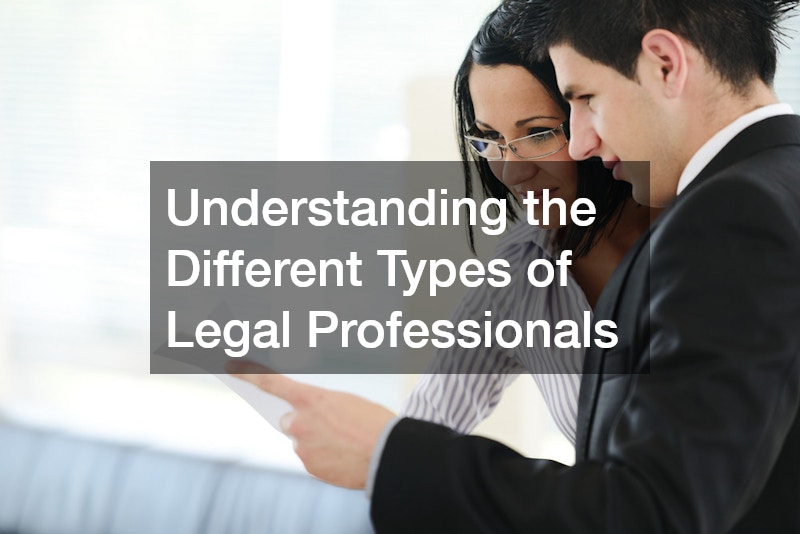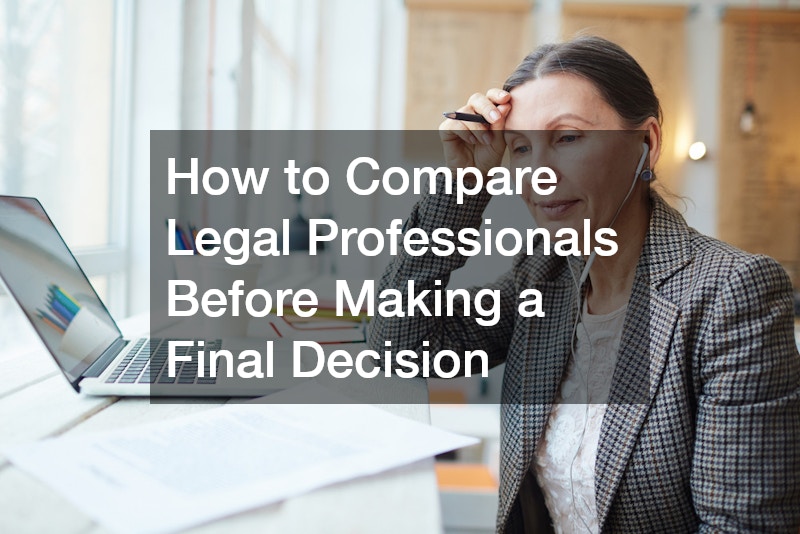
Understanding the Different Types of Legal Professionals

Before choosing someone to represent you, it’s essential to understand the types of professionals available. Not all legal matters require the same skill set, and the wrong choice can lead to delays, costly mistakes, or ineffective representation.
Recognizing Key Areas of Practice
Legal issues fall into multiple practice areas—from family matters to financial planning to criminal defense. Understanding these categories will help you narrow your search and avoid choosing someone who doesn’t handle your type of case.
Common practice categories include:
-
Family-related needs
-
Criminal cases
-
Financial planning
-
Injury or accident cases
-
Real estate matters
-
Business disputes
-
Civil litigation
-
Elder or capacity-related concerns
Many professionals focus primarily on one or two of these areas. Choosing someone who works daily within the right category is one of the most important steps in achieving the best outcome.
Why Location and Structure Matter
Selecting a local lawyer can offer significant advantages. These professionals understand community courts, regional legal norms, local procedures, and nearby service providers. They often have established relationships with judges, clerks, and other legal professionals.
Similarly, the structure of the law office can shape your experience.
Here’s how to evaluate it:
Solo Practice
-
Highly personalized service
-
Direct attorney access
-
Best for straightforward cases
Small or Mid-Size Practice
-
Multiple professionals with varied skills
-
More availability for complex cases
-
Broader support staff
Larger Practice
-
Specialized staff and resources
-
Efficient processing of documents and filings
-
Often used for high-complexity or high-stakes matters
Evaluating the structure helps you match the professional environment to the complexity of your needs.
Key Factors to Evaluate When Facing Family-Related Legal Challenges
Family challenges require sensitivity, skill, and a deep understanding of interpersonal dynamics. These cases are often emotionally driven and involve significant legal responsibilities and long-term consequences.
Evaluating Experience with Family Issues
A reliable family-focused professional should have substantial experience with situations such as separation, custody, financial division, support agreements, and long-term planning for children. Working with someone from a divorce law firm or experienced divorce lawyers ensures exposure to complex situations and established strategies.
When determining their experience, consider asking:
-
How many cases similar to yours they handle yearly
-
How they typically resolve difficult negotiations
-
How they collaborate with mediators or counselors
-
What options they recommend for minimal conflict
Understanding Case Complexity Before Choosing Representation
Not all family matters require intensive representation. If your situation is amicable and uncomplicated, you might only need limited guidance. However, if your case involves high-conflict communication, disputes over property, or child-related complications, choosing someone equipped with broader resources makes a difference.
Signs your case may benefit from a team approach:
-
Numerous shared assets
-
Disagreement over parenting arrangements
-
History of communication difficulties
-
Emotional or financial vulnerabilities
-
Significant imbalances in power or knowledge
Key Questions to Ask During Consultations
Your consultation should provide clarity on not only legal strategy but also communication style and expectations.
Important questions include:
-
What is your typical communication response time?
-
How do you prefer to resolve disputes?
-
What are your billing practices?
-
What is your approach to negotiations?
-
Do you recommend mediation or collaborative methods?
Clear communication and honest guidance are essential traits in family representation.
Selecting the Right Professional for Sensitive or High-Risk Situations

Certain situations require immediate, skilled, trauma-informed support. These include emotionally charged or unsafe circumstances that require urgent legal intervention.
Evaluating Advocacy Skills and Case History
When dealing with sensitive matters, the ability to provide strong, reliable protection is critical. Professionals who routinely handle these cases understand the importance of safety, quick action, and clear documentation. Choosing the best domestic violence attorney or a skilled local family attorney can ensure that you receive informed, compassionate, and effective assistance
Key attributes to look for include:
-
Ability to file urgent motions or orders
-
Experience working with crisis shelters or counselors
-
Strong communication with law enforcement
-
Strategic planning for long-term safety
Verifying Professional Background and Focus
Request specific examples of similar past cases. While confidentiality prevents full disclosure, a seasoned professional can offer an overview of their approach.
Ask about:
-
Courtroom experience
-
Ability to secure protective orders
-
Their approach when situations escalate
-
Support for safety planning
-
Knowledge of community resources
Why Trauma-Informed Practice Matters
In cases involving fear, manipulation, or harm, the right approach can greatly influence not only the legal outcome but also emotional stability.
A supportive professional should:
-
Prioritize your safety at all times
-
Use communication that avoids triggering stress
-
Provide clear explanations to reduce overwhelm
-
Work calmly and professionally during conflict
-
Offer guidance for maintaining long-term stability
This specialized insight can make the process more manageable.
Choosing Representation After an Injury or Accident
Accidents and unexpected injuries require professionals who can negotiate aggressively, understand liability, and manage evidence.
Evaluating Negotiation Strength
Strong negotiation skills are essential for reaching fair settlements or preparing for trial. Personal injury attorneys often work with insurance companies and opposing parties, making it important to choose someone who can clearly demonstrate their history of achieving favorable outcomes.
Evaluate negotiation ability by asking:
-
How many cases they settle vs. take to trial
-
Their typical settlement range
-
How they handle stubborn or aggressive insurers
-
Their process for calculating losses
Understanding Liability and Defense Considerations
In some scenarios, both civil and potential defense issues may arise. You may also need additional insight from a criminal lawyer if allegations or charges complicate an injury case.
Examples of cases where both areas overlap:
-
Vehicle accidents involving reckless driving
-
Workplace incidents tied to safety violations
-
Claims involving conflicting witness statements
-
Accidents where both parties share fault
The right professional will explain your rights in plain language and help you navigate overlapping concerns.
Questions to Ask About Fees and Processes
Clarify key details before hiring someone.
Important areas to cover:
-
Billing structure (contingency, hourly, hybrid)
-
Responsibility for upfront costs
-
Expected timeline
-
Evidence gathering methods
-
Communication expectations
This transparency helps you avoid unpleasant surprises.
Navigating Long-Term Planning and Decision-Making
Long-term planning is a crucial part of protecting your future and your family’s well-being. These services involve documents, strategies, and oversight designed to provide stability and continuity.
Identifying Professionals Who Specialize in Long-Term Strategies
Many issues require detailed knowledge of planning tools, such as wills, trusts, health directives, and financial plans. Working with an estate planning attorney ensures that your documents are thorough, legally sound, and tailored to your goals.
When You Need More Than Basic Document Preparation
Some situations demand more guidance than simple paperwork. Cases involving capacity, financial oversight, or long-term care for vulnerable individuals can require representation familiar with conservatorships.
These scenarios may include:
-
A family member losing the ability to manage finances
-
High-value assets needing structured oversight
-
Ongoing healthcare decisions requiring a responsible party
-
Complex family dynamics
-
Disagreements among siblings or heirs
Evaluating Experience with Family Dynamics and Sensitive Issues
Because long-term arrangements often intersect with emotional concerns, it’s essential to choose someone who understands how to manage conflicts while protecting your interests.
Look for:
-
Clear explanations of every option
-
A calm, structured communication style
-
Experience navigating disagreements respectfully
-
Ability to mediate between family members
-
Strong organizational skills
Choosing someone with the right temperament can prevent future disputes.
How to Compare Legal Professionals Before Making a Final Decision

Before choosing representation, comparing your options carefully helps ensure you hire someone who fits your needs and communication style.
Evaluating Communication and Reliability
Effective communication is vital. Notice how quickly the professional returns messages, how clearly they explain concepts, and how transparent they are about expectations.
Consider these questions:
-
Do they respond within a reasonable timeframe?
-
Do they provide clear timelines and next steps?
-
Do they listen before offering advice?
-
Do they explain complicated topics without jargon?
The right professional will make you feel informed and understood.
Understanding Fee Structures and Contracts
Fee structures vary by practice area and case complexity. Before signing any agreement, make sure you fully understand how billing works.
Common structures include:
-
Hourly billing
-
Flat fees
-
Contingency fees
-
Retainer agreements
Ask for detailed explanations of:
-
Payment timelines
-
Refund policies
-
What happens if complications arise
-
Whether additional staff contribute to billing
How to Check Credentials, Reviews, and Case Results
Reviews can help, but they should be only one part of your decision. Consider asking about licensure, certifications, years in practice, and past case outcomes.
Additional ways to evaluate legitimacy:
-
Reviewing publicly available disciplinary records
-
Assessing their professional website for clarity and experience
-
Asking former clients (if they’re willing)
-
Requesting sample timelines or case summaries
These steps help you get a full picture of their skill and reliability.
Preparing for Your First Consultation
Your consultation is a key opportunity to determine whether the professional is the right fit.
Organizing Documents and Information
Bring organized, clearly labeled documents. This helps the professional understand your situation quickly.
Prepare:
-
Timelines of events
-
Contracts, messages, or letters
-
Relevant photos or records
-
Identification documents
-
Financial information (if needed)
Communicating Goals and Concerns Clearly
Explain what you hope to achieve. Share concerns openly so that the professional can provide personalized advice.
Helpful topics to mention:
-
Your ideal outcome
-
Deal-breakers or boundaries
-
Any fears about the process
-
Important deadlines
-
Family or financial concerns
Evaluating Fit and Comfort Level
Throughout the meeting, assess whether the professional makes you feel confident.
Ask yourself:
-
Do they listen carefully?
-
Do they explain everything clearly?
-
Do they treat you with respect?
-
Do they seem invested in helping you?
-
Do you feel comfortable being honest with them?
Your comfort and trust levels are crucial indicators of whether the relationship will be successful.
Common Mistakes to Avoid When Choosing Legal Representation

Choosing the wrong professional can complicate your situation or prolong the process unnecessarily.
Rushing the Decision Without Proper Research
Avoid choosing the first professional you speak with unless they clearly meet your needs and expectations.
Focusing Only on Price Instead of Value
Cheaper isn’t always better—nor is the most expensive option.
Better criteria include:
-
Experience
-
Focus area
-
Communication style
-
Level of support
-
Strategic approach
Ignoring Personality Fit
Your legal professional will become a key partner in sensitive matters. A poor personality fit can lead to stress and misunderstandings.
Assuming All Professionals Handle Cases the Same Way
Approaches vary widely. Some are aggressive; others focus on negotiation or mediation. Some are highly communicative; others check in only when necessary.
Focus on finding someone whose approach aligns with your needs.
Taking the time to compare your options thoughtfully also helps you build a working relationship based on trust and transparency. The more comfortable you feel with your chosen professional, the more openly you can communicate about your concerns, goals, and expectations. This openness allows them to develop strategies tailored to your needs and gives you a stronger sense of control throughout the process. By approaching the search with intention and clarity, you set the foundation for a smoother experience and a more successful outcome.



